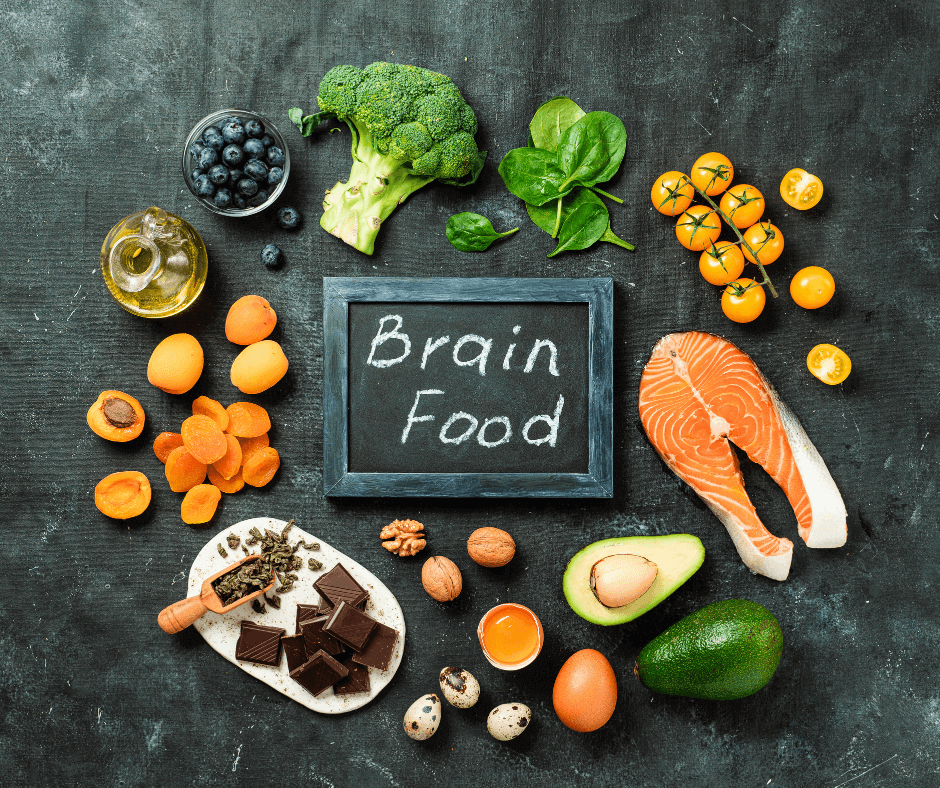13 Best Foods to Boost Your Brain and Memory

Brain food is a term we use when we are looking for a boost in brainpower. We quite often turn to these foods if we are feeling low in energy, lacking in concentration or motivation. Modern day, hectic lifestyles can make it difficult to find the time to nourish your body with the correct nutrition needed to help maintain optimal brain health and memory function. This blog will look at the concept of brain foods, discuss their potential to boost brain health, and highlight the top 13 foods that can enhance memory and cognitive function.
It is important to note that peak brain performance and optimal brain health is also dependent on other factors including exercise and sleep. The brain, like other areas of the body, has specific nutrients that are more important to its health and function than others.
What Is a Brain Food?
Brain foods, or food for the brain are the foods specifically known for their value in brain health and performance. The best brain foods are nutrient-rich substances that provide the necessary building blocks for optimal brain function. These foods contain essential vitamins, minerals, antioxidants, and omega-3 fatty acids, which promote brain health and support cognitive functions such as memory, focus, and concentration.
Can Food Boost Brain Health?
There is a lot of research out there that suggests that certain foods can boost brain health and enhance cognitive function. While the brain's complex workings are influenced by various factors, including genetics and lifestyle choices, a nutritious diet plays a vital role in supporting overall brain health. Incorporating brain foods into your daily meals can provide the necessary nutrients to nourish your brain, improve memory, and even protect against age-related cognitive decline.
13 Brain Foods for Optimal Brain Health:
-
Fatty Fish: Rich in omega-3 fatty acids, fatty fish like salmon, sardines, and trout are excellent brain-boosting choices. The benefits of omega 3 on the brain include they help to build brain cell membranes and promote brain cell communication, enhancing memory and reducing the risk of cognitive decline (1).
-
Marine algae: Marine algae or algal oil, is an alternative source of omega 3 for the brain to fatty fish that is suitable for vegans and vegetarians. Like in fatty fish, marine algae contain both the omega-3 fatty acids DHA and EPA. DHA has shown particular importance in brain performance and health and is a key component of brain cells (2).
- Blueberries: Packed with antioxidants and flavonoids, blueberries have been shown to improve brain health and delay brain aging. They also contain anthocyanins, which have been linked to enhanced memory and cognitive function (3).
- Turmeric: The active ingredient in turmeric, curcumin, has potent anti-inflammatory and antioxidant properties. It may help improve memory and stimulate the production of brain-derived neurotrophic factor (BDNF), a protein that promotes brain cell growth (4, 5).
- Broccoli: Rich in antioxidants and high in compounds like glucosinolates, broccoli supports brain health and may slow down the aging process. It also contains vitamin K, which has been linked to improved memory (6).
- Pumpkin Seeds: These small seeds are a powerhouse of nutrients, including magnesium, iron, zinc, and copper. They are rich in antioxidants and provide a range of essential nutrients that support brain health and improve memory (7).
- Dark Chocolate: Dark chocolate contains flavonoids, caffeine, and antioxidants that can enhance focus and improve blood flow to the brain. It also stimulates the release of endorphins, promoting a positive mood making this tasty brain food a winner (8).
- Nuts: Packed with antioxidants, healthy fats, and vitamin E, nuts like walnuts, almonds, and cashews are excellent brain-boosting snacks. They support brain health, improve cognition, and may reduce the risk of neurodegenerative diseases (9).
- Oranges: Loaded with vitamin C, oranges are known for their antioxidant properties. Vitamin C helps prevent mental decline and supports a healthy brain by reducing oxidative stress (10).
- Eggs: Eggs are a great source of several nutrients that contribute to brain health, including vitamins B6 and B12, folate, and choline. Choline plays a crucial role in memory and brain development (11).
- Green Tea: Green tea contains caffeine, antioxidants, and L-theanine, a compound that can enhance brain function, promote alertness, and improve memory and focus. L-theanine is an adaptogen helping you deal with stress better, shown to potentially reduce cortisol levels in the body (12).
- Avocados: Rich in healthy fats, avocados support brain health and improve blood flow. They are also an excellent source of vitamin K and folate, which have been associated with improved cognitive function and memory (13).
- Whole Grains: Whole grains, such as brown rice, oats, and quinoa, provide a steady release of glucose into the bloodstream, supplying the brain with a constant source of energy. They are also rich in vitamins B6, B12, and folate, which help reduce homocysteine levels in the blood and prevent brain-related conditions (14).
A healthy diet is just one aspect of maintaining brain health. Regular exercise, quality sleep, stress management, and mental stimulation also play crucial roles in optimizing cognitive function. By adopting a holistic approach that combines these elements, you can support your brain's vitality and enjoy improved memory, focus, and overall cognitive performance.
If it is difficult to obtain brain foods through the diet alone, nutrition supplements like vitamin D3 and vitamin B12 have also shown a lot of promise in clinical studies to help protect against neurogenerative disorders like dementia. Supplementation can be a good addition to a healthy diet to ensure optimal vitamin levels are achieved.
References:
- https://www.ncbi.nlm.nih.gov/pmc/articles/PMC4404917/
- https://www.ncbi.nlm.nih.gov/pmc/articles/PMC3111183/
- https://www.ncbi.nlm.nih.gov/pmc/articles/PMC7442370/
- https://www.ncbi.nlm.nih.gov/pmc/articles/PMC2781139/
- https://pubmed.ncbi.nlm.nih.gov/31279955/
- https://www.ncbi.nlm.nih.gov/pmc/articles/PMC8575925/
- https://www.ncbi.nlm.nih.gov/pmc/articles/PMC9182978/
- https://www.ncbi.nlm.nih.gov/pmc/articles/PMC7071338/
- https://www.ncbi.nlm.nih.gov/pmc/articles/PMC7071526/
- https://www.ncbi.nlm.nih.gov/pmc/articles/PMC5009163/
- https://www.ncbi.nlm.nih.gov/pmc/articles/PMC7352907/
- https://pubmed.ncbi.nlm.nih.gov/28899506/
- https://pubmed.ncbi.nlm.nih.gov/24108469/
- https://www.ncbi.nlm.nih.gov/pmc/articles/PMC2935890/




Comments
Lascia un commento
Your Email Address Will Not Be Published. Required Fields Are Marked *